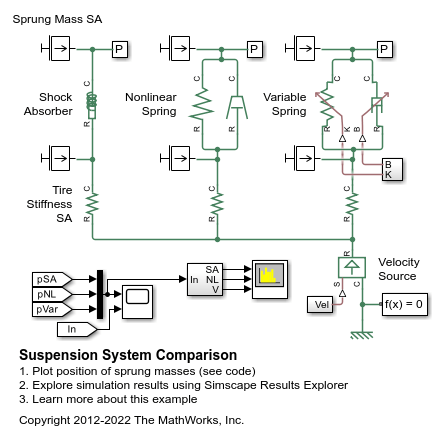Variable Translational Spring
Translational spring with variable spring stiffness
Libraries:
Simscape /
Driveline /
Couplings & Drives /
Springs & Dampers
Description
The Variable Translational Spring block represents a translational spring with variable stiffness. A physical signal input port provides the variable spring stiffness. The magnitude of the spring force is equal to the product of the physical signal input and the relative linear displacement between the two translational conserving ports. A minimum spring rate prevents nonphysical values.
The translational spring force satisfies the following expression:
where:
F is the force transmitted through the spring between the two translational conserving ports.
K is the spring rate coefficient.
Kmin is the minimum allowed spring rate.
x is the relative displacement between the two translational conserving ports according to .
xinit is the initial spring deformation.
xR is the absolute displacement of the translational conserving port R.
xC is the absolute displacement of the translational conserving port C.
The block applies equal and opposite spring forces on the two translational conserving ports. The sign of the spring force acting on port R is equal to the sign of the relative linear displacement between the two ports. A positive linear velocity corresponds to a positive spring force acting on port R, and a negative spring force of equal magnitude acting on port C.
Assumptions and Limitations
The block limits the value of the variable spring stiffness to remain above zero.
Variables
To set the priority and initial target values for the block variables prior to simulation, use the Initial Targets section in the block dialog box or Property Inspector. For more information, see Set Priority and Initial Target for Block Variables.
Nominal values provide a way to specify the expected magnitude of a variable in a model. Using system scaling based on nominal values increases the simulation robustness. Nominal values can come from different sources, one of which is the Nominal Values section in the block dialog box or Property Inspector. For more information, see Modify Nominal Values for a Block Variable.
Examples
Ports
Input
Conserving
Parameters
Extended Capabilities
Version History
Introduced in R2013a

